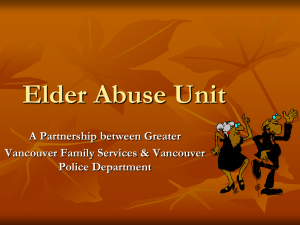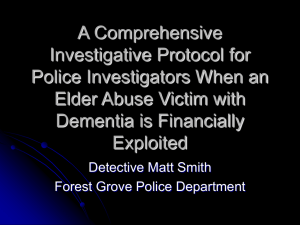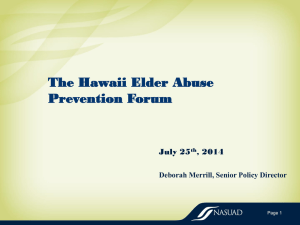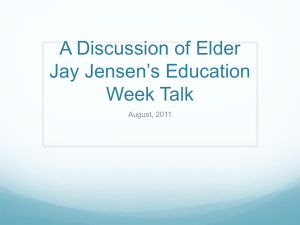You and Elder Abuse - alberta elder abuse
advertisement
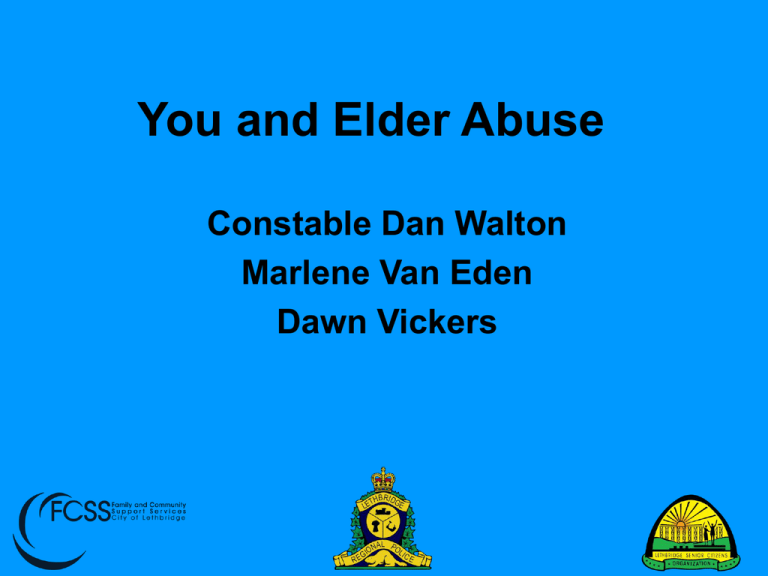
You and Elder Abuse Constable Dan Walton Marlene Van Eden Dawn Vickers You and Elder Abuse What is Elder Abuse? • Have you witnessed Elder Abuse? • Can you make a difference? • Why should I care? Does this really effect me and my family? You and Elder Abuse • Elder abuse is any action or inaction by self or others that jeopardizes the heath or well being of an older adult. This includes physical, emotional, psychological, financial, sexual or medical abuse, as well as passive or active neglect. You and Elder Abuse Where does elder abuse take place? • Elder abuse takes place where the senior lives: most often in the home where the abuser are apt to be adult children, other family members or spouses /partners of elders. • Institutional settings especially long term care facilities can also be sources of elder abuse. You and Elder Abuse Physical Abuse • • • • • • Assaults by Kicking Slapping Punching Striking with objects Deliberate exposure to severe weather You and Elder Abuse Psychological Abuse • • • • • Humiliation Isolation Intimidation Threats Removal of decision making powers • Verbal insults, yelling You and Elder Abuse Financial Abuse • • • • Misuse of funds Property Fraud Trickery or Force You and Elder Abuse Sexual Abuse Any forced sexual activity: • Verbal or suggestive behavior • Fondling • Sexual intercourse • Lack of personal privacy • Being forced to commit degrading acts • Unnecessary help with dressing/hygiene You and Elder Abuse Medication Abuse • On purpose or by accident • Withholding medication • Overmedicating • Not complying with prescription refills You and Elder Abuse Neglect • Lack of action required to meet needs of the elderly • Inadequate provision of food, clothing, shelter medication and social companionship • Minimal personal care You and Elder Abuse Passive Neglect • Unintentional failure to fulfill a caretaking obligation • Infliction of distress without conscious or willful intent You and Elder Abuse Active Neglect • Intentional failure to fulfill care giving obligations, infliction of physical or emotional stress or injury • Abandonment, denial of food, medication, personal hygiene You and Elder Abuse You and Elder Abuse Theories of Abuse • Learning Theory • Physical/Mental Dependence • Pathologic Abusers • Feminist Theory • Stressed Caregiver • Societal Attitudes You and Elder Abuse SIGNS OF ABUSE • Unexplained bruises or welts • Injuries that are incompatible with the explanation • Cuts, pinch marks, lacerations • Malnourished or dehydrated • Untreated medical attention • Home in need of repairs You and Elder Abuse Signs Continued.. • • • • • • Confused, frightened Withdrawn and forgetful Depressed, helpless Disoriented about time and place Telling impulsive stories Hesitant to talk freely You and Elder Abuse Signs Continued… • Significant withdraws form the elder’s account • Sudden changes in financial conditions • Items of cash missing from seniors household • Suspicious changes in wills, power of attorney, titles and policy You and Elder Abuse Signs Continued… • Additions to names in senior’s signing card • Unpaid bills or lack of medical care, senior unable to pay for these services • Unexplained ATM uses when senior not there • Unnecessary services, goods and subscriptions You and Elder Abuse WHAT CAN YOU LOOK FOR…. • Watch for warning signs • Watch elder’s medication if in care at home or facility • Watch for signs of financial abuse • Stay in touch make sure the elder never is isolated at home or long term care You and Elder Abuse Risk Factors Among Caregivers • Inability to manage the level of stress • Depression (common among caregivers) • Lack of support from other potential caregiver • Substance abuse • Caregivers perception that care giving of the elder is burdensome and without psychological reward You and Elder Abuse Even caregivers in institutional settings can experience stress at levels that lead to Elder Abuse. Nursing home staff may be prone to elder abuse if they: • Lack training • Have too many responsibilities • Are unsuited to care giving or • Work under poor conditions You and Elder Abuse Protective Factors for Older Persons Older persons are less likely to be abused or neglected if: • They are aware of their rights • Have a strong self esteem • Have positive relationships within family • Are served by well trained, well paid staff with high staff-resident ratios and • Social connectedness at a community level You and Elder Abuse Preventing Elder Abuse • LISTEN to seniors and their caregivers • INTERVENING when you suspect elder abuse • EDUCATING others about how to recognize and report elder abuse You and Elder Abuse What Caregivers Can Do To Prevent Elder Abuse… If they feel overwhelmed by demands of caring for an elder do the following: • Request help from friends, family, relatives, local respite care agencies, get a break so you are not frustrated You and Elder Abuse Caregiver Assistance Continued: • • • • • • Find Adult daycare program Stay healthy and take care of yourself Adopt stress reduction practices Seek counseling for depression Find support groups If abusing substances to cope get help You and Elder Abuse HOW TO PROTECT YOURSELF AS AN ELDER • Make sure financial and legal affairs are in order. If they are not, get advise from legal or trusted friend or family. • Keep in touch with family and friends. Don’t isolate yourself. You and Elder Abuse • If you are unhappy with the care you are getting speak out, whether at home or care facility, SPEAK UP! • Tell someone you trust to assist and report abuse, neglect or substandard care • Get help and report You and Elder Abuse • Contact Lethbridge Regional Police Diversity Unit, Dan Walton 403 330-5133 • Lethbridge Seniors Citizens Organization, Marlene Van Eden 403 320-2222 • Supports Services Coordinator City of Lethbridge, Dawn Vickers 403 329-7396 You and Elder Abuse Thank you for your time and attention! We are always here to help so don’t hesitate to call Questions ?????????????
